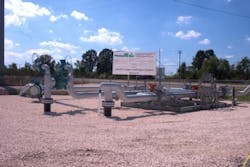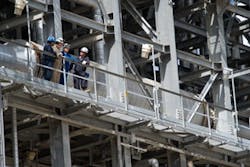Reliability Efforts Broaden
Reliability improvement remains imperative for chemical makers. Most companies focus their efforts at the plant and asset level but a broader approach promises even better results. At least that's what two major firms — Air Products and Chemicals, Allentown, Pa., and Dow Chemical, Midland, Mich. — are finding.
Air Products has established nine Operations Service Centers (OSC) to improve the reliability of its plants. The first opened in Nanjing, China, in 2009; other centers now are located in Pasadena, Texas, (Figure 1) as well as in France, Korea, Malaysia, Poland, Spain, Taiwan and the U.K.
"Originally, each plant had its own operations services. We realized that by centralizing this function there would be important benefits, notably much increased reliability — together with improved energy efficiency and reduced costs," notes Wilbur Mok, vice president of North American tonnage gases.
"Until we had a view of all plants on the same operations board, we didn't realize how different they all are were, for example in terms of operating parameters. When you operate plants differently, one may have advantages and may be operating better than another. We took the best operating practices and shared them globally. So now we operate each plant in the same way."
To reinforce these benefits, the company staffs its OSCs with its most experienced operators and supervisors. The OSC frees up site teams to spend more time on higher value tasks such as preventive maintenance, improvement projects and troubleshooting.
Besides the OSC, Air Products has established a Customer Service Center (CSC) in Pasadena. The two work hand-in-hand to ensure reliable supplies to the company's North America industrial facilities and its Gulf Coast hydrogen plant and pipeline supply network.
The OSC oversees the daily production at the plants while the CSC works with customers and communicates with the OSC on product need and when to supply it. Essentially, both centers aim to improve reliability: the OSC that of each plant, and the CSC that of the entire pipeline network.
"Initially we created CSCs for the Texas and Louisiana pipeline systems, but we centralized this function when the two were joined (Figure 2). The drivers here are essentially the same as for the OSCs: to improve supply reliability and to provide better customer communication and interface. The CSC also manages the operation and supply/demand of the pipeline system, as well as driving system efficiency," says Mok.
The CSC monitors inputs from pipeline customers and uses a proprietary optimization package to ensure the system is run as reliably and efficiently as possible.
SIGNIFICANT BENEFITS
The OSC/CSC strategy has resulted in better plant designs, changes to plant equipment and improved operating procedures. The company is actively seeking to enhance its optimization tools, too.
"In terms of savings, we do have targets and returns in mind, both in terms of productivity and energy savings. Although I can't comment on the actual figures involved, I can say that we are definitely satisfied with the returns being made by pursuing this strategy, hitting our targets and well on our way to achieving desired returns on our investment," Mok adds.
Collaboration between the Pasadena OSC and CCS played a key role in ensuring customers continued to receive the hydrogen they required during Hurricane Isaac in August 2012.
Many customers likely to be affected by Isaac decided to shut down their plants. This took a toll on Air Products hydrogen output because a lot of its plants are on customer sites and depend upon their utilities to operate.
So, the Pasadena OSC and CSC closely worked together to leverage the company's Gulf Coast pipeline, which stretches from the Houston Ship Channel to New Orleans (Figure 2). More than 20 hydrogen production facilities feed the 600-mile pipeline, which supplies over 1.2 billion cubic feet of hydrogen per day to refinery and petrochemical customers.
Air Products was able to source hydrogen for customers in Louisiana from its production facilities hundreds of miles away in Texas — supplying customers not affected by the hurricane as well as those affected that continued to operate through the storm. In addition, the company was able to immediately deliver more hydrogen to another customer, which had an urgent need for additional supplies.
HOLISTIC APPROACH
Focusing reliability efforts only on the issues within production plants misses significant opportunities, emphasizes Paul Dean, global director, reliability and operations productivity services for Dow Chemical. So, the company is sharpening its long-standing focus on reliability by adapting concepts learned from its pursuit of operational excellence.
"This is a broader and more holistic focus on reliability across the entire value chain. The vision: zero unplanned events that impact external stakeholder commitments," says Dean.
This wider application of proven reliability methodologies is enhancing productivity and margin growth. Other essential elements of the approach include: engaging with suppliers who embrace Dow's reliability vision and their role in exceeding quality and service targets for customers; using advanced analytics to uncover and implement improvement opportunities; and tracking reliability in production units, work flows and value chains via customized and localized performance metrics.
The enterprise-wide reliability effort at Dow is founded upon every employee's ability to reduce the tolerance for defect or deviation from the best practice or desired end state (Figure 3). So all staff are sensitized to the importance of, e.g., improving reliability and reducing hidden factory waste. Dow's entrenched lean/six sigma culture also supports this productivity effort — helping to design new processes and improve current ones to deliver the customer satisfaction at the lowest possible internal cost.
"The concept of holistic reliability seems simple to envision, but implementation is a never-ending pursuit, especially in a diverse and large organization such as Dow. And as with everything we do, our employees are always the most fundamental element to our success. Throughout the company, we are seeing even greater ownership to focus on the sustainable reduction of unplanned events, as well as the drive to develop deeper understanding for their role in achieving enterprise-wide reliability. We want each employee to clearly understand how their work impacts commitments made to external stakeholders," notes Dean.
"Taking our holistic view, with engagement and accountability across the entire value chain, the company has and will continue to show strong improvement in areas where the rate of progress had otherwise slowed," he stresses.




